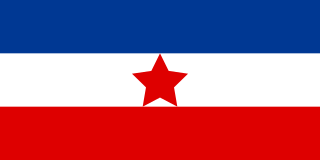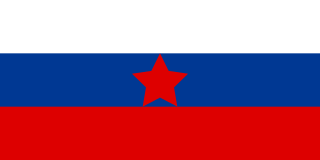
The Kingdom of Yugoslavia was a state in Southeast and Central Europe that existed from 1918 until 1941. From 1918 to 1929, it was officially called the Kingdom of Serbs, Croats and Slovenes, but the term "Yugoslavia" was its colloquial name due to its origins. The official name of the state was changed to "Kingdom of Yugoslavia" by King Alexander I on 3 October 1929.
Yugoslav or Yugoslavian may refer to:

The Socialist Federal Republic of Yugoslavia, commonly referred to as SFR Yugoslavia or simply Yugoslavia, was a country in Southeast and Central Europe that existed from its foundation in the aftermath of World War II until its dissolution in 1992 amid the Yugoslav Wars. Covering an area of 255,804 km2, the SFRY was bordered by the Adriatic Sea and Italy to the west, Austria and Hungary to the north, Bulgaria and Romania to the east, and Albania and Greece to the south. The nation was a socialist state and a federation governed by the League of Communists of Yugoslavia and made up of six socialist republics – Bosnia and Herzegovina, Croatia, Macedonia, Montenegro, Serbia, and Slovenia – with Belgrade as its capital. In addition, it included two autonomous provinces within Serbia: Kosovo and Vojvodina. The SFRY's origin is traced to 26 November 1942, when the Anti-Fascist Council for the National Liberation of Yugoslavia was formed during World War II.

League of Communists of Croatia was the Croatian branch of the League of Communists of Yugoslavia (SKJ). Until 1952, it was known as Communist Party of Croatia.

The Socialist Party of Serbia is a left-wing populist political party in Serbia that identifies as democratic socialist and social-democratic. The Socialist Party of Serbia was the direct descendant of the League of Communists of Serbia. Throughout its existence, the party has utilised some nationalist rhetoric and themes, and has therefore been labelled a Serbian nationalist party, although the SPS has never identified itself as such.

The Yugoslav Partisans, or the National Liberation Army, officially the National Liberation Army and Partisan Detachments of Yugoslavia, was the Communist-led resistance to the Axis powers in occupied Yugoslavia during World War II.
A multinational state is a sovereign state that comprises two or more nations or states. This contrasts a nation state, where a single nation accounts for the bulk of the population. Depending on the definition of "nation", a multinational state might also be multicultural or multilingual.

The Democratic League of Kosovo is one of the three largest political parties in Kosovo, alongside its longtime rival, the Democratic Party of Kosovo, & Vetevendosje.

The breakup of Yugoslavia occurred as a result of a series of political upheavals and conflicts during the early 1990s. After a period of political and economic crisis in the 1980s, constituent republics of the Socialist Federal Republic of Yugoslavia split apart, but the unresolved issues caused bitter inter-ethnic Yugoslav wars. The wars primarily affected Bosnia and Herzegovina, neighbouring parts of Croatia and, some years later, Kosovo.

The Socialist Republic of Bosnia and Herzegovina, commonly referred to as Socialist Bosnia or simply Bosnia, was one of the six constituent federal states forming the Socialist Federal Republic of Yugoslavia. It was a predecessor of the modern-day Bosnia and Herzegovina, existing between 1945 and 1992, under a number of different formal names, including Democratic Bosnia and Herzegovina (1943–1946) and People's Republic of Bosnia and Herzegovina (1946–1964).
A national liberation movement is an organization engaged in a war of national liberation.
Milan Đukić was a Croatian Serb politician. He was the leader of the Serb People's Party, and a former deputy speaker of the Croatian Parliament.

Ilirida or the Republic of Ilirida is a proposed state in the western regions of North Macedonia, declared twice by the politician Nevzat Halili, once in 1992 and again in 2014. The proposal has been declared unconstitutional by the Macedonian government. The secessionist concept of Ilirida emerged in the early 1990s and was advocated by some Albanian politicians as a solution to concerns and disputes the Albanian community had regarding constitutional recognition and minority rights within Macedonia.

Slovenian nationalism is the nationalism that asserts that Slovenes are a nation and promotes the cultural unity of Slovenes. Slovenian nationalism first arose in response to the influx of ideas of nationalism from the French Revolution that arrived in Slovenia when the French forces of Napoleon Bonaparte made Slovenia part of the Illyrian Provinces from 1809 to 1813. Slovenian nationalists such as Anton Korošec endorsed Yugoslav unification during World War I as a means to free Slovenia from Austro-Hungarian rule.

Yugoslavism or Yugoslavdom refers to the unionism, nationalism, or patriotism associated with South Slavs/Yugoslavs and Yugoslavia. Yugoslavism has historically advocated the union of all South Slav populated territories now composing Bosnia and Herzegovina, Croatia, Montenegro, Serbia, Slovenia, North Macedonia, and, for some like Ivan Meštrović, Bulgaria. It became a potent political force during World War I with the assassination of Archduke Franz Ferdinand of Austria by the Yugoslavist militant Gavrilo Princip and the subsequent invasion of Serbia by Austria-Hungary. During the war the Yugoslav Committee composed of South Slav emigres from Austria-Hungary, supported Serbia and vouched for the creation of a Yugoslav state. On 1 December 1918, King Peter of Serbia proclaimed the Kingdom of Serbs, Croats, and Slovenes, commonly known as "Yugoslavia". During the Yugoslav period, a Yugoslav identity was propagated.

The Slovene Partisans, formally the National Liberation Army and Partisan Detachments of Slovenia, were part of Europe's most effective anti-Nazi resistance movement led by Yugoslav revolutionary communists during World War II, the Yugoslav Partisans. Since a quarter of Slovene ethnic territory and approximately 327,000 out of total population of 1.3 million Slovenes were subjected to forced Italianization since the end of the First World War, the objective of the movement was the establishment of the state of Slovenes that would include majority of Slovenes within a socialist Yugoslav federation in the post-War period.

Montenegrin nationalism is the nationalism that asserts that Montenegrins are a nation and promotes the cultural unity of Montenegrins.

Democratic Federal Yugoslavia was a charter member of the United Nations from its establishment in 1945 as the Socialist Federal Republic of Yugoslavia until 1992 during the Yugoslav Wars. During its existence the country played a prominent role in the promotion of multilateralism and narrowing of the Cold War divisions in which various UN bodies were perceived as important vehicles. Yugoslavia was elected non-permanent member of the United Nations Security Council on multiple occasions in periods between 1950–1951, 1956, 1972–1973, and 1988–1989, which was in total 7 years of Yugoslav membership in the organization. The country was also one of 17 original members of the Special Committee on Decolonization.
Anarchism is a political theory that is anti-authoritarian. It focuses on the rejection of government, state, and societal control, especially through rulers or higher authorities. Anarchist ideas and movements have existed in Serbia for many years, and have acted as catalysts for much of the political and social turmoil that has embroiled the country. Throughout every period of political rule, from the control of the Ottoman Empire to the first monarchs of Serbia, Karadjordje and Milan Obrenovic, through the occupation by the Axis powers during World War II, the government has faced opposition and resistance from the public. This opposition has often come from key figures and anarchist groups that have fought against governments and any form of higher authority. Anarchist groups such as the Anarcho-Syndicalists, and movements including Otpor! have contributed to the resistance against the government. The anarchist movement continues in Serbia today against the current President Aleksandar Vučić and his government, with protests being held every week against their authority.












